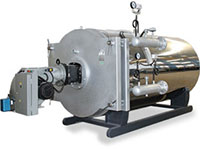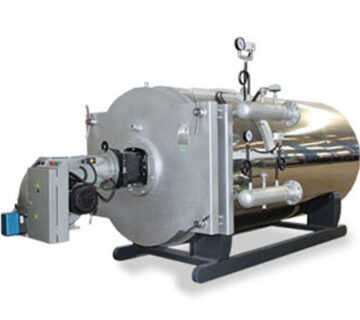Introduction
Industrial hot oil boilers are essential components in heating systems used across a range of industries. These boilers, due to their ability to provide high temperatures without the need for high steam pressure, are widely utilized in industries such as oil, gas, chemical, and food processing. This article provides a comprehensive overview of industrial hot oil boilers, their benefits, applications, and essential tips for selection and maintenance.

What is an Industrial Hot Oil Boiler?
An industrial hot oil boiler is a system designed to generate and transfer heat at high temperatures. Unlike steam boilers, hot oil boilers use thermal oil as the heat transfer medium, which allows the system to operate at very high temperatures (up to 350°C) without the need for high pressure. This characteristic makes them highly efficient and safe for various industrial heating applications.
Advantages of Using Industrial Hot Oil Boilers
- Precise Temperature Control: These boilers allow for precise temperature management up to 350°C without high-pressure steam.
- High Safety Levels: Since they don’t require high-pressure steam, the risk of explosions or pressure-related incidents is significantly reduced.
- Lower Operating Costs: Hot oil boilers generally have lower maintenance requirements and operating costs compared to steam boilers.
Types of Industrial Hot Oil Boilers
Industrial hot oil boilers come in different forms based on the design and functionality:
- Horizontal and Vertical Boilers: Depending on space requirements and heat distribution needs.
- Single-pass and Multi-pass Boilers: Depending on the required efficiency levels.
- Fixed or Portable Systems: Depending on the industrial site’s mobility requirements.

Applications of Hot Oil Boilers in Various Industries
- Oil and Gas: Used in refining and petrochemical processes.
- Food Processing: For heating oils and food products in production lines.
- Chemical Industry: To provide heat in chemical production processes.
- Textile Industry: For dyeing and drying processes.
Comparison Between Hot Oil Boilers and Steam Boilers
In this section, we will highlight the major differences:
- Higher Operating Temperatures: Hot oil boilers can provide much higher temperatures than steam boilers without requiring high pressure.
- Energy Efficiency: Due to their design, hot oil boilers consume less energy compared to steam systems.
New Technologies in Industrial Hot Oil Boilers
Recent technological advancements such as heat recovery systems and automation have made hot oil boilers more efficient. These innovations reduce energy consumption and improve the overall performance of heating systems in industries.

Maintenance and Service Tips for Hot Oil Boilers
To maximize the efficiency and lifespan of hot oil boilers, regular maintenance is essential. Key maintenance tasks include:
- Regular Oil Change: Replacing thermal oil at appropriate intervals to maintain performance.
- Routine Inspections: Performing regular checks on components to avoid system failures.
How to Choose the Right Industrial Hot Oil Boiler
When selecting the ideal boiler for your industry, consider the following:
- Heating Capacity: Choose a system that meets the specific heating demands of your operations.
- Quality and Brand: Opt for boilers from reputable manufacturers with a proven track record in safety and efficiency.
Safety Tips for Using Industrial Hot Oil Boilers
Here are a few essential safety guidelines:
- Use Standard Thermal Oils: Ensure that you use high-quality thermal oil to avoid operational issues.
- Monitor Pressure and Temperature: Use sensors and automation systems to avoid overheating or excessive pressure.
Cost Efficiency with Hot Oil Boilers
Energy-saving technologies and proper insulation can significantly lower the operational costs of hot oil boilers, making them an attractive option for energy-conscious businesses.
Factors Affecting the Cost of Industrial Hot Oil Boilers
Several factors influence the pricing of industrial hot oil boilers:
- Heating Capacity: Larger systems generally cost more.
- Brand and Quality: Boilers from well-known manufacturers with high-quality components tend to be more expensive.
- Safety Standards: Boilers with more advanced safety features typically have a higher price.

Conclusion
Industrial hot oil boilers offer a highly efficient, safe, and cost-effective solution for various heating processes in industries. Choosing the right system based on your specific needs can enhance operational efficiency and reduce long-term costs.
Questions & Answers
1. What is an industrial hot oil boiler?
A system used to transfer heat at high temperatures without high steam pressure, typically found in industries like oil, gas, and food processing.
2. Why are hot oil boilers safer than steam boilers?
They don’t require high-pressure steam, reducing the risk of explosions or pressure-related accidents.
3. What industries use hot oil boilers?
They are widely used in oil and gas, food processing, chemicals, and textiles.


